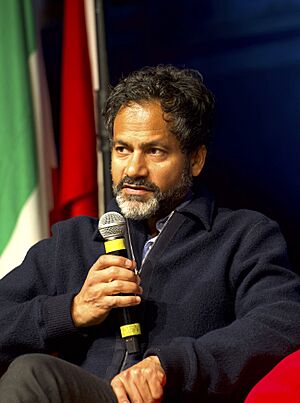Jameel Jaffer facts for kids
Quick facts for kids
Jameel Jaffer
|
|
|---|---|

Jaffer at the International Journalism Festival in 2024
|
|
| Born | 1971 (age 54–55) |
| Nationality | Canadian |
| Alma mater | Williams College (BA) University of Cambridge (MPhil) Harvard University (JD) |
| Occupation | Lawyer |
| Known for | Human rights work |
Jameel Jaffer is a Canadian lawyer who works to protect human rights and civil liberties. He is the first director of the Knight First Amendment Institute at Columbia University. This institute was created to protect freedom of speech and the press, especially online.
The Knight Institute works by taking legal action, doing research, and teaching the public. One of their first big cases was a successful challenge against President Trump. They argued that he could not block people who criticized him on his Twitter account.
Before this, Jameel Jaffer was a Deputy Legal Director at the American Civil Liberties Union (ACLU). He was well-known for his work using the Freedom of Information Act. This law helps people get government documents. Through his efforts, many documents were released. These documents showed how prisoners were treated at places like the Guantanamo Bay detention camp. They also revealed information about secret CIA sites.
The documents included orders signed by Secretary of Defense Donald Rumsfeld. There were also emails from FBI agents who saw how prisoners were treated. Autopsy reports for prisoners who died in U.S. custody were also released. Legal memos from the Office of Legal Counsel were made public too. These memos discussed whether certain harsh methods of questioning might be allowed. The New York Times called this lawsuit "one of the most successful in the history of public disclosure."
Contents
Early Life and Education
Jameel Jaffer's family comes from Tanzania. His father's family is from Zanzibar, and his mother's family is from Dar es Salaam. His family follows the Isma'ilism branch of Islam. However, Jaffer himself does not describe himself as religious.
Jaffer grew up in Canada. He went to Upper Canada College, a private school in Toronto. He earned his first degree from Williams College in 1994. He then got his master's degree from the University of Cambridge in 1996. In 1999, he earned his law degree (called a Juris Doctor) from Harvard Law School. While at Harvard, he was an editor for the Harvard Law Review. After finishing law school, Jaffer worked for Beverley McLachlin. She was the Chief Justice of Canada at that time.
Legal Career and Important Cases
Jameel Jaffer is the first director of the Knight First Amendment Institute at Columbia University. He worked for the American Civil Liberties Union (ACLU) from June 2002 until August 2016.
Protecting Privacy and Free Speech
In 2004, Jaffer won a case that challenged a part of the USA Patriot Act. This part allowed the government to get information without a court order. A federal court ruled that this part was against the U.S. Constitution. Even after Congress changed the law, the court ruled against it again in 2007.
In 2006, Jaffer took on a case about Tariq Ramadan. He is a well-known Islamic thinker. The Bush administration had refused to give him a visa to enter the U.S. Jaffer argued that this was wrong. In 2009, a federal appeals court agreed with Jaffer and his clients. They said that stopping Professor Ramadan from entering the country was unconstitutional. After this ruling, the Obama administration changed its mind and gave Dr. Ramadan a visa.
Government Secrecy and Transparency
In 2012 and 2013, Jaffer won two important appeals. These cases were about the Obama administration's refusal to release certain documents. These documents were from the Justice Department and related to a program that involved "targeted killing."
In 2012, Jaffer argued a case called Clapper v. Amnesty International USA before the U.S. Supreme Court. This case challenged a law that gave the National Security Agency (NSA) wide power. This power allowed them to watch international communications. The Supreme Court ruled against Jaffer's clients. They said the plaintiffs did not have the right to bring the lawsuit.
In March 2015, Jaffer, along with Jimmy Wales and Lila Tretikov from the Wikimedia Foundation, filed a lawsuit. This case challenged the National Security Agency's (NSA) surveillance activities. They argued that the U.S. government was intercepting and searching almost all international and many domestic text messages on the Wikimedia platform.
Between 2010 and 2016, Jaffer helped lead the legal effort that led to the release of the Obama administration's "drone memos." These documents were about the U.S. drone program. Jaffer also wrote a book about this topic called The Drone Memos: Targeted Killing, Secrecy, and the Law. It was published in November 2016. Edward Snowden said the book was very important. He felt it helped correct the way officials talked about these policies.
Until August 2016, Jaffer was the deputy legal director of the ACLU. He also directed the ACLU's Center for Democracy. This center focused on free speech, privacy, technology, national security, and international human rights. He worked on cases about government surveillance, how prisoners were treated, and "targeted killing."
Jaffer is also an Executive Editor for Just Security. This is a website that discusses national security topics.
Community Involvement
In 2009, Jaffer was invited to celebrate Ramadan at the White House.

